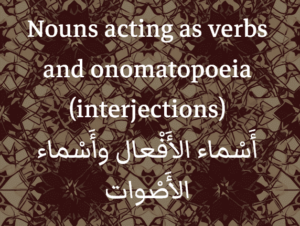The interjection in Arabic can be a noun acting as onomatopoeia or a noun acting as a verb without accepting its signs or conjugation with only one static form for all (singular, dual, plural, masculine, and feminine). Furthermore they are indeclinable (مَبْنيّ). We can consider them to be the equivalent of interjections in the English language. These tend to give more emphasis and clarity to the action described by the verb, thus making its meaning more vivid.
These interjections can be divided into three categories according to their use:
- Interjections with a past tense meaning
- Interjections with a present tense meaning
- Interjections expressing the imperative
Interjections with a past tense meaning
| شَتّانَ how different! | سُرْعانَ it was not long before |
| هَيْهاتَ how far! | بُطْآنَ slowly |
Interjections with a present tense meaning
| بَخٍ bravo! | أُفٍّ argh! |
| وَي oh! | آه ah! |
Interjections expressing the imperative
| إِلَيْكَ عَنّي leave me alone! | إِلَيْكَ here it is! |
| آمِين amen | عَلَيْكَ you have to |
| صَهْ silence! | رُوَيْدَ / مَهْلًا slowly! |
| عِنْدَكَ / لَدَيْكَ / دُونَكَ / هاء take! | مَهْ stop! |
| وَرَاءَكَ step back | أَمامَكَ be careful! go forward! |
| حَيَّ come! | مَكانَكَ stay! |
| هَلُمَّ come here! | هَيّا / هَيْتَ quick! speed up! |
Now, let’s test your knowledge
⌨️ Practice Arabic typing with our Arabic keyboard featuring automatic tashkil/diacritization
Nouns acting as verbs and onomatopoeia

Learn about the fascinating world of Arabic language with a deep dive into nouns acting as verbs and onomatopoeia. Enhance your understanding of Arabic grammar and expand your vocabulary with these unique language features.
Course Provider: Organization
Course Provider Name: ArabiKey
Course Provider URL: https://arabikey.com
5


I have a hard time imagining an “interjection with a past tense meaning”. Would you mind giving a further example and a few examples? Thanks, wa al shukur 🙂
These interjections often appear in contexts where the speaker is reflecting on something that has already happened, which is why they are associated with past or completed actions.
Example : “هَيْهَاتَ هَيْهَاتَ لِمَا تُوعَدُونَ” (Surah Al-Mu’minun, 23:36) which could be translated into “Far, far [is] that which you are promised!”
The past tense meaning here is implied in the sense that the speaker is reflecting on a judgment or realization about the promise, considering it to be something impossible or out of reach, based on their understanding or disbelief at that moment.